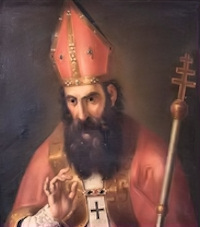
Daily Readings for:May 06, 2014
(Readings on USCCB website)
Collect: O God, who open wide the gates of the heavenly Kingdom to those reborn of water and the Holy Spirit, pour out on your servants an increase of the grace you have bestowed, that, having been purged of all sins, they may lack nothing that in your kindness you have promised. Through our Lord Jesus Christ, your Son, who lives and reigns with you in the unity of the Holy Spirit, one God, for ever and ever.
RECIPES
ACTIVITIES
o Marian Hymn: Bring Flowers of the Fairest
PRAYERS
o Regina Coeli (Queen of Heaven)
o Prayers for the Easter Season
· Easter: May 6th
· Tuesday of the Third Week of Easter
Old Calendar: St. John before the Latin Gate; St Evodius, disciple
According to the 1962 Missal of St. John XXIII the Extraordinary Form of the Roman Rite, today is the feast of St. John before the Latin Gate. A tradition mentioned by St. Jerome, which goes back to the second century, says St. John the Apostle was taken to Rome under the Emperor Domitian and plunged into a cauldron of boiling oil; by a striking miracle he came out safe and sound from this torture. A church dedicated in honor of St. John was built near the Latin Gate, the spot referred to by the tradition.
Historically today is the feast St. Evodius one of the seventy-two disciples Christ, and Catholic tradition has always held that he was the first bishop of Antioch after St. Peter. As bishop of Antioch, he was the first to coin the word “Christian” to refer to the disciples of Jesus. He probably died between the years 64-67, when he was then succeeded by St. Ignatius of Antioch.
St. John before the Latin Gate
One day Salome presented her two sons, James and John, to Jesus, and with a mother’s ambition asked Him to grant them the highest places in his Kingdom. In reply, the Savior spoke of the chalice which He Himself would have to drink, and foretold that these two disciples would also drink of it. The elder, James the Great, was the first to give his Master this proof of his love. John, the younger brother, offered his life in testimony of Jesus’ divinity.
But the martyrdom of the latter Apostle called for a scene worthy of the event. Asia Minor, which his zeal had evangelized, was not a sufficiently glorious land for such a combat. Rome, whither Peter had transferred his Chair and where he died on his cross, and where Paul had bowed down his venerable head beneath the sword, alone deserved the honor of seeing the beloved disciple march on to martyrdom, with that dignity and sweetness which are the characteristics of this veteran of the Apostolic College.
In the year 95 John appeared before the tribunal of pagan Rome. He was convicted of having propagated, in a vast province of the Empire, the worship of a Jew who had been crucified under Pontius Pilate. He was considered a superstitious and rebellious old man, and it was time to rid Asia of his presence. He was, therefore, sentenced to an ignominious and cruel death.
A huge cauldron of boiling oil was prepared in front of the Latin Gate. The sentence ordered that the preacher of Christ be plunged into this bath. The hour had come for the second son of Salome to partake of his Master’s chalice. John’s heart leapt with joy. After cruelly scourging him, the executioners seized the old man, and threw him into the cauldron. But, lo! the boiling liquid lost all its heat; the Apostle felt no scalding. On the contrary, when they took him out again he felt all the vigor of his youthful years restored to him.
The praetor’s cruelty was foiled, and John, a martyr in desire, was to be left to the Church for some few years longer. An imperial decree banished him to the rugged Isle of Patmos, where God revealed to him the future of the Church even to the end of time.
— Excerpted from The Liturgical Year, Abbot Gueranger O.S.B.
St. Evodius
Very little is known of the life of St. Evodius. However, he was a pagan who converted to Christianity due to the apostolic work of Saint Peter. In the Book of Acts, one of the first communities to receive evangelism were the Jews and pagans of Antioch. The city was opulent and cosmopolitan, and there were both Hellenized Jews and pagans influenced by monotheism. The term "Christian" was coined for these Gentile (mainly Syrian and Greek) converts, and St. Peter became the bishop of Antioch and led the church there. Evodius succeeded Peter the Apostle as bishop of Antioch when Peter left Antioch for Rome.
St. Evodius was bishop of Antioch until 69 AD, and was succeeded by St. Ignatius of Antioch. It is more likely that St. Evodius died of natural causes, in office, than that he was martyred. As one of the first pagans to come to the new church, he is venerated in both the Roman Catholic Church of the east and Orthodox Churches of the East as a saint. His feast day in the Roman Catholic Church is May 6 and in the Orthodox Church it is September 7.
Excerpted from Wikipedia